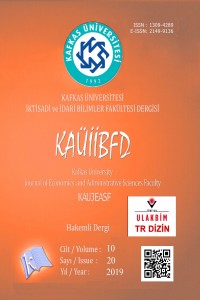HYMAN P. MINSKY’S “BIG GOVERNMENT” APPROACH IN SECURING ECONOMIC STABILITY AND ITS APPLICABILITY IN THE TURKISH ECONOMY
Öz
The aim of this article is to discuss the applicability of Hyman P. Minsky’s “big government policy” proposal in the Turkish economy. According to Minsky, one of the main causes of economic cycles is the private sector’s decreasing investments and profits. The government is able to contribute to economic stability by reversing the decreasing investments and profits by means of big government policies. Turkish macroeconomic data verifies theoretical explanations of big government regarding total profits. Moreover, budget indicators show that the government can implement big government policies to secure financial and economic stability in Turkey.
Anahtar Kelimeler
Big Government Sectoral Financial Balances Economic Stability
Kaynakça
- Fazzari S. M. (1999), “Minsky and the Mainstream: Has Recent Research Rediscovered Financial Keynesianism”, The Jerome Levy Economic Institute, Working Paper, No: 278.
- Kregel J. (1992), “Minsky’s ‘Two Price’ Theory of Financial Instability and Monetary Policy: Discounting versus Open Market Intervention”, Ed. Steven Fazzari and Dimitri B. Papadimitriou, Financial Conditions and Macroeconomic Performance – Essays in Honor of Hyman P. Minsky, M.E. Sharpe Inc. Armonk New York, USA, 85-103.
- Minsky H. P. (1989a), “Profit, Deficits and Instability: A Policy Discussion”, The Jerome Levy Economics Institute of Bard College, Hyman Minsky Archive, Paper 148.
- Minsky, H. P. (1989b), “The Financial Instability Hypothesis: A Clarification”, The Jerome Levy Economics Institute of Bard College, Hyman Minsky Archive, Paper 145.
- Minsky, H. P. (1992), “Prices in a Financially Sophisticated Capital-Using Capitalist Economy”, The Jerome Levy Economics Institute of Bard College, Hyman Minsky Archive, Paper 35.
- Minsky, H. P. (1994), “Failed and Successful Capitalism: Lessons from the Twentieth Century”, The Jerome Levy Economics Institute of Bard College, Hyman Minsky Archive, Paper No: 47.
- Minsky, H. P. (2008), Stabilizing an Unstable Economy, The McGraw-Hill Company, USA.
- Papadimitriou D. B., Nikiforos M., Zezza G. (2018), “Can Greece Grow Faster?”, The Jerome Levy Economics Institute of Bard College, Strategic Analysis, November.
- Parenteau R. (2010). On Fiscal Correctness and Animal Sacrifices (Leading the PIIGS to Slaughter, Part 1), http://www.nakedcapitalism.com/2010/03/parenteau-on-fiscal-correctness-and-animal-sacrifices-leading-the-piigs-to-slaughter-part-1.html.
- Wray L. R. ve E. Tymoigne (2008), “Macroeconomics Meets Hyman P. Minsky: The Financial Theory of Investment”, The Jerome Levy Economics Institute of Bard College, Working Paper No: 543.
- Zezza G. (2009), “Fiscal Policy and the Economics of Financial Balances” The Jerome Levy Economics Institute of Bard College, Working Paper No: 569.
- Turkish Statistical Institute.
- Ministry of Development: Economic and Social Indicators (1950-2010), Annual Plans .
- World Bank Database.
Ayrıntılar
| Birincil Dil | İngilizce |
|---|---|
| Bölüm | Makaleler |
| Yazarlar | |
| Yayımlanma Tarihi | 31 Aralık 2019 |
| Kabul Tarihi | 27 Aralık 2019 |
| Yayımlandığı Sayı | Yıl 2019 Cilt: 10 Sayı: 20 |
KAÜİİBFD, Kafkas Üniversitesi İktisadi ve İdari Bilimler Fakültesi Dergi Yayıncılığı'nın kurumsal dergisidir.
KAÜİİBFD 2022 yılından itibaren Web of Science'a dahil edilerek, Clarivate ürünü olan Emerging Sources Citation Index (ESCI) uluslararası alan endeksinde taranmaya başlamıştır.

